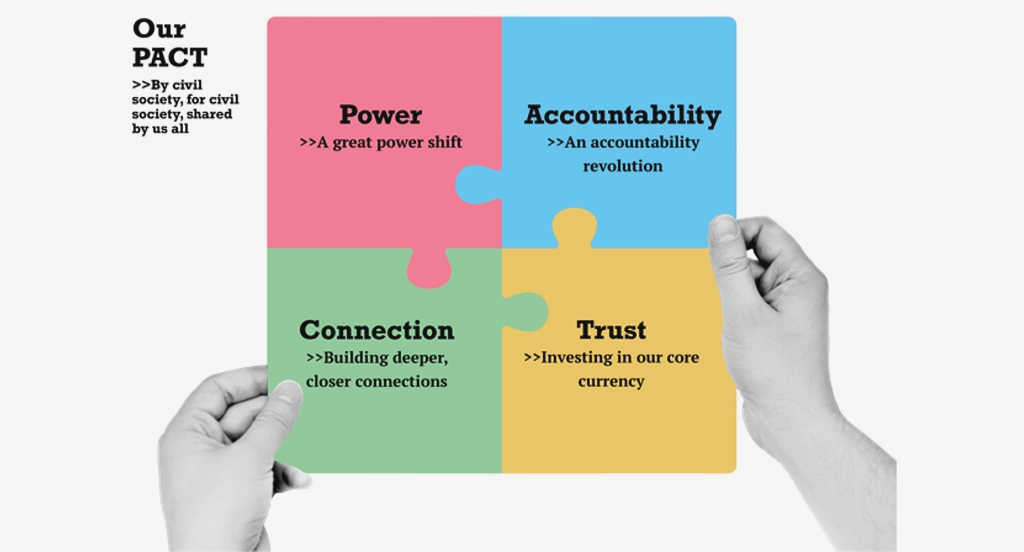As we look towards the future, it is clear that philanthropy will play a key role in shaping a better world. Civil society, made up of non-profit organizations and individuals driven by a common purpose, has long been a driving force for change. However, in recent years, philanthropy has taken on a new significance as it has become increasingly intertwined with technological advancements and the evolving needs and aspirations of communities around the globe.
In an era where social and environmental challenges are becoming more complex and interconnected, philanthropy has the potential to act as a catalyst for positive change. By leveraging their resources, networks, and expertise, philanthropists are able to address pressing issues, support innovative solutions, and amplify the impact of civil society organizations. Whether it is funding education initiatives, investing in healthcare infrastructure, or promoting sustainable development, philanthropy has the power to drive systemic change and create a more equitable and sustainable world.

Furthermore, the future of philanthropy is being shaped by a growing emphasis on collaboration and collective impact. Recognizing that no single organization or individual can solve all the world‘s problems alone, philanthropists are increasingly partnering with other actors to maximize their effectiveness. Through collaborative efforts, philanthropic organizations are able to pool their resources, share best practices, and coordinate their interventions to tackle complex challenges at scale.
At the same time, technology is transforming the philanthropic landscape, making it easier than ever for individuals to engage in giving and for organizations to measure and track their impact. Online platforms and crowdfunding campaigns have democratized philanthropy, allowing anyone with an internet connection to contribute to causes they care about. Additionally, emerging technologies such as blockchain and artificial intelligence are being explored to enhance transparency, accountability, and efficiency in the philanthropic sector.
The Role of Philanthropy in Shaping Society
Philanthropy plays a crucial role in shaping society by addressing critical social issues and providing resources to those in need. It is a vehicle through which individuals, organizations, and foundations can contribute to the betterment of their communities and the world at large.
Addressing Social Issues: Philanthropy enables individuals and organizations to support causes and initiatives that aim to tackle pressing social issues. Whether it is addressing poverty, education, healthcare, or environmental concerns, philanthropic efforts play a key role in identifying and implementing solutions.
Providing Resources: Philanthropy provides essential resources to communities and organizations that may not have access to mainstream funding. Through grants, donations, and investments, philanthropists help bridge the gap between resources and needs, ensuring that valuable projects can be implemented and sustained.
Creating Change: Philanthropy is a driving force behind positive social change. By investing in innovative ideas and projects, philanthropists can support initiatives that have the potential to transform societies and improve the lives of individuals. Through partnerships and collaborations, philanthropy can amplify the impact of efforts by bringing together diverse stakeholders.
Influencing Policy and Advocacy: Philanthropy also plays a role in shaping society by influencing policy and advocating for social change. Through strategic funding, philanthropists can support organizations and movements that work towards policy changes and provide a voice to marginalized communities.
Promoting Collaboration: Philanthropy encourages collaboration among different stakeholders, including governments, nonprofits, and businesses. By fostering partnerships and networks, philanthropy helps build coalitions that can tackle complex social issues more effectively.
Long-Term Sustainability: Philanthropy plays a critical role in promoting long-term sustainability. By investing in education, research, and capacity building, philanthropic efforts contribute to building a stronger civil society that can continue to address social challenges in the future.
Ultimately, philanthropy serves as a catalyst for positive change in society, empowering individuals and organizations to make a lasting impact in areas that need it the most. Through their generosity and commitment, philanthropists shape society by creating opportunities, addressing social issues, and fostering collaboration and sustainable development.
The Power of Giving: Impacting Communities
Philanthropy plays a significant role in shaping the future of civil society by positively impacting communities around the world. Through giving, individuals and organizations can make a real difference in the lives of people who are in need. Whether it is providing educational opportunities, access to healthcare, or supporting social and environmental causes, the power of giving has the potential to transform communities.
One of the key benefits of philanthropy is its ability to address pressing social issues. By funding initiatives that tackle poverty, inequality, and other systemic challenges, philanthropists can help create sustainable solutions that have a lasting impact. For example, philanthropic investments in education can empower individuals to break the cycle of poverty and contribute to the development of their communities.

Furthermore, the power of giving extends beyond financial contributions. Philanthropists can also donate their expertise, time, and networks to support nonprofits and grassroots organizations. Through mentorship programs, skill-sharing initiatives, and volunteering, individuals can make a meaningful difference in their communities. This kind of support can help organizations build capacity, improve efficiency, and amplify their impact.
Another important aspect of philanthropy is its potential to inspire collective action. When individuals see the difference that philanthropic efforts can make, it can motivate them to get involved and contribute to the common good. By spreading awareness about social and environmental issues, philanthropists can mobilize others to join their cause and create a ripple effect of positive change throughout communities.
In conclusion, the power of giving has the ability to impact communities in significant ways. Through financial contributions, expertise sharing, and inspiring collective action, philanthropy plays a crucial role in shaping a better future for civil society. By recognizing and supporting the importance of philanthropy, we can work together to create more equitable and sustainable communities.
Innovative Approaches: Philanthropy and Technology
Technology has revolutionized the way philanthropy operates, providing innovative approaches to solving social and environmental challenges. One of these approaches is the use of crowdfunding platforms, which enable individuals to contribute to projects and causes that resonate with them. This democratizes philanthropy and allows for greater transparency and accountability as donors can directly see the impact of their contributions.
Furthermore, technology has also facilitated the rise of data-driven philanthropy. By analyzing large datasets and employing advanced algorithms, philanthropic organizations can identify trends, make informed decisions, and allocate resources more efficiently. This not only maximizes the impact of their initiatives but also enables them to address systemic issues and drive lasting change.

Artificial Intelligence (AI) and Machine Learning in Philanthropy
Artificial intelligence (AI) and machine learning are also playing a crucial role in shaping the future of philanthropy. These technologies can analyze vast amounts of data to identify patterns and correlations, enabling philanthropic organizations to predict future needs and develop targeted interventions.
Additionally, AI-powered chatbots and virtual assistants have made it easier for individuals to access information about philanthropic opportunities and get involved. They can provide personalized recommendations based on users’ interests and preferences, making the philanthropic experience more engaging and meaningful.
Blockchain Technology for Transparent and Trustworthy Philanthropy
Blockchain technology has the potential to revolutionize philanthropy by ensuring transparency, accountability, and trust in the sector. Through blockchain, donors can track their contributions from the point of donation to the point of impact, ensuring that funds are used as intended and eliminating the risk of corruption.
Moreover, blockchain can facilitate direct peer-to-peer giving, bypassing traditional intermediaries and reducing transaction costs. This enables individuals in need to receive assistance more quickly and efficiently, making philanthropy a more inclusive and impactful endeavor.
The Importance of Collaboration: Partnerships in Philanthropy
In the world of philanthropy, collaboration and partnerships play a crucial role in shaping a better future for civil society. Through collaborating with various stakeholders, philanthropic organizations are able to maximize their impact and create lasting change. By pooling resources, sharing expertise, and leveraging networks, these partnerships allow for a more coordinated and effective approach to addressing the complex social, economic, and environmental issues that societies face today.
Collaboration enables philanthropic organizations to tap into complementary strengths and knowledge. Each partner brings their unique perspectives, experiences, and skills to the table, leading to more innovative and comprehensive solutions. Whether it is a partnership between nonprofits, corporations, governments, or community groups, the diversity of ideas and expertise fosters greater creativity and problem-solving capabilities. By working together, these organizations can achieve outcomes that would be difficult or impossible to accomplish on their own.
Partnerships in philanthropy also help to amplify impact. By combining resources, organizations can scale up their initiatives, reach more individuals and communities, and address systemic issues at a macro level. Whether it is through joint funding, shared infrastructure, or collaborative programming, these partnerships enable philanthropic organizations to achieve larger-scale change and generate greater social, environmental, and economic benefits.
Furthermore, partnerships play a vital role in building trust and legitimacy within civil society. Collaborating with other organizations signals a commitment to collaboration, transparency, and shared goals. This enhances perceptions of credibility and accountability, which are crucial for attracting support and resources from various stakeholders, including donors, governments, and the communities that they serve.
In summary, collaboration and partnerships are essential in the world of philanthropy. They allow organizations to leverage their collective expertise, resources, and networks, leading to more impactful and sustainable solutions. By working together, philanthropic entities can maximize their potential for positive change and contribute to shaping a better future for civil society.
Philanthropy and Education: Investing in the Future
Education is the foundation of a prosperous society and a key driver of social and economic progress. Recognizing the important role that education plays in shaping the future, philanthropy has emerged as a powerful force in supporting educational initiatives and creating opportunities for individuals to thrive.
Enabling Access to Quality Education
One of the ways philanthropy contributes to education is by enabling access to quality education for individuals who would otherwise face barriers. Through scholarships and grants, philanthropists are able to provide financial support to students from disadvantaged backgrounds, allowing them to pursue higher education and acquire the knowledge and skills necessary for success in the modern world.
Supporting Innovation and Research
Philanthropy also plays a crucial role in supporting innovation and research in the field of education. By funding research projects and supporting educational institutions, philanthropists are able to drive advancements in teaching methods, curriculum development, and educational technology. This investment in innovation ensures that the education system continues to evolve and adapt to the changing needs of the future workforce.
Addressing Inequality in Education
Another important aspect of philanthropy’s impact on education is its role in addressing inequality. By directing resources towards underserved communities and marginalized groups, philanthropists can help bridge the education gap and create equal opportunities for all. This includes initiatives focused on reducing educational disparities based on factors such as race, gender, socio-economic status, and geographic location.
Building Partnerships and Collaboration
Philanthropy also has the power to forge partnerships and foster collaboration among various stakeholders in the education sector. By bringing together governments, NGOs, educational institutions, and communities, philanthropic initiatives can leverage collective expertise and resources to tackle shared challenges and work towards common goals. This collaborative approach strengthens the impact of philanthropy and extends its reach to create sustainable change in education.
In conclusion, philanthropy plays a vital role in shaping the future of education. By investing in quality education, promoting innovation, addressing inequality, and fostering collaboration, philanthropists are able to create a better world where every individual has access to the knowledge and opportunities they need for a brighter future.
Philanthropy and Health: Improving Lives
Health is one of the most essential aspects of human life. However, not everyone has equal access to healthcare and medical services. Philanthropy plays a crucial role in improving lives and promoting better health outcomes for individuals and communities.
Through philanthropic initiatives, organizations and individuals can support the development and implementation of innovative healthcare solutions. This includes funding medical research, building modern healthcare facilities, and providing access to essential medications and treatments.
Supporting Medical Research
Philanthropy enables the advancement of medical research, which is crucial for understanding diseases and developing effective treatments and prevention strategies. By providing financial support to research institutions, philanthropists can contribute to groundbreaking discoveries and scientific breakthroughs that have the potential to save lives and improve overall health outcomes.
Improving Healthcare Infrastructure
Philanthropic efforts can contribute to the construction and improvement of healthcare infrastructure, particularly in underserved areas. This includes building hospitals, clinics, and healthcare centers equipped with modern facilities and technologies. By investing in healthcare infrastructure, philanthropists can ensure that individuals in these communities have access to quality healthcare services, leading to improved health outcomes.
Providing Access to Medications and Treatments
Pharmaceutical costs and lack of access to essential medications can be major barriers to healthcare for many individuals, especially in low-income communities. Philanthropy can address this issue by supporting initiatives that provide access to medications and treatments that are otherwise unaffordable. Through partnerships with pharmaceutical companies and other stakeholders, philanthropic organizations can help bridge the gap and ensure that individuals have access to life-saving drugs and treatments.
Overall, philanthropy plays a vital role in improving health outcomes and ensuring that everyone has access to quality healthcare services. By supporting medical research, improving healthcare infrastructure, and providing access to medications and treatments, philanthropists contribute to creating a better world where health is a fundamental right.
Philanthropy and the Environment: Addressing Global Challenges
In today’s world, the environment faces numerous global challenges that require urgent action. Philanthropy plays a crucial role in addressing these challenges and shaping a better future for our planet. Through their generous support, philanthropists contribute to initiatives and projects aimed at safeguarding the environment and ensuring its sustainability for future generations.
1. Supporting Conservation Efforts: Philanthropic organizations and individuals provide significant funding for conservation efforts around the world. They support projects aimed at protecting endangered species, preserving natural habitats, and promoting sustainable land and water management practices. These initiatives help prevent further loss of biodiversity and work towards maintaining the delicate balance of ecosystems.
2. Investing in Renewable Energy: Philanthropy plays a vital role in advancing the development and adoption of renewable energy sources. By funding research and innovation, philanthropists help accelerate the transition from fossil fuels to clean, sustainable energy. This not only reduces greenhouse gas emissions but also promotes energy independence, creates jobs, and drives economic development.
3. Promoting Environmental Education and Awareness: Philanthropists recognize the importance of educating society about environmental issues and empowering individuals to make informed choices. They support initiatives that promote environmental education in schools, universities, and communities. By raising awareness and providing resources, philanthropy helps foster a sense of environmental responsibility and encourages sustainable practices in all aspects of life.
4. Collaborating with Local Communities: Effective environmental conservation requires the involvement and cooperation of local communities. Philanthropy plays a crucial role in fostering collaborative partnerships with indigenous communities, local organizations, and grassroots initiatives. Through grants and support, philanthropists empower these communities to play an active role in natural resource management, environmental stewardship, and sustainable development.
5. Addressing Climate Change: Philanthropy plays a significant role in addressing the global challenge of climate change. By investing in initiatives that mitigate greenhouse gas emissions, support climate adaptation strategies, and promote sustainable agriculture, philanthropists contribute to the collective effort of combating climate change. Their contributions help build resilience, protect vulnerable communities, and create a more sustainable future for our planet.
Overall, philanthropy plays a critical role in addressing the global environmental challenges we face today. Through their support, philanthropists contribute to conservation efforts, promote renewable energy, educate communities, collaborate with local stakeholders, and address climate change. By working together, we can create a better future for our planet and ensure its sustainability for generations to come.
Ethical Considerations: Transparency and Accountability
Transparency
Transparency is a crucial ethical consideration in the future of civil society and philanthropy. It implies openness and disclosure of information to the public, allowing individuals to access and evaluate the actions and decisions of organizations. Transparency promotes trust and credibility, as it demonstrates accountability and a commitment to ethical behavior. In the context of philanthropy, transparency ensures that donors and beneficiaries have a clear understanding of how funds are being allocated and utilized.

Accountability
Accountability goes hand in hand with transparency, encompassing the responsibility of organizations and individuals to answer for their actions and decisions. In the future of civil society and philanthropy, accountability plays a crucial role in ensuring that resources are effectively utilized and that the intended impact is achieved. Organizations should be accountable not only to their donors and beneficiaries, but also to the wider public and society as a whole. This requires clear lines of responsibility and mechanisms to track and report progress.
Building a Culture of Transparency and Accountability
Creating a culture of transparency and accountability within civil society and philanthropy is essential for long-term sustainability and impact. This can be achieved through a combination of policies, practices, and tools that promote openness, honest communication, and clear reporting. Organizations should establish clear ethical guidelines and codes of conduct, ensuring that all stakeholders understand their roles and responsibilities. Regular reporting and evaluation should also be conducted, allowing for stakeholders to assess the effectiveness and impact of initiatives.
Advancements in technology have the potential to greatly enhance transparency and accountability within civil society and philanthropy. Online platforms and digital tools can facilitate the sharing of information, making it more accessible and understandable to the public. Blockchain technology, for example, can ensure the immutability and traceability of transactions, providing a higher level of transparency and accountability. Furthermore, data analytics can be utilized to track and evaluate the impact of philanthropic initiatives, providing evidence-based insights and supporting decision-making.
- Key considerations for promoting transparency and accountability:
- Establishing clear ethical guidelines and codes of conduct
- Regular reporting and evaluation of initiatives
- Utilizing technology to enhance transparency and accountability
Conclusion
In the future of civil society and philanthropy, ethical considerations such as transparency and accountability are paramount. By promoting transparency and ensuring accountability, organizations can build trust, credibility, and long-term impact. This requires a commitment to openness, clear reporting, and the use of technology to facilitate information sharing and evaluation. Ultimately, fostering a culture of transparency and accountability will contribute to shaping a better world through philanthropy.
Philanthropy and Social Justice: Creating an Equal Society
Philanthropy plays a crucial role in promoting social justice and creating a more equitable society. Through strategic giving, philanthropic organizations and individuals can address systemic inequalities and empower marginalized communities.
One of the key ways philanthropy contributes to social justice is by funding initiatives that tackle poverty and economic inequality. By supporting programs that provide access to education, job training, and financial resources, philanthropists can help individuals break the cycle of poverty and improve their economic prospects.
Furthermore, philanthropy can also address social justice issues such as racial discrimination and inequality. By supporting organizations that advocate for equal rights and opportunities, philanthropists can work towards eliminating systemic racism and promoting inclusivity.
In addition to addressing immediate needs, philanthropy can also focus on root causes of social injustice. By funding research and policy initiatives, philanthropists can contribute to the development of evidence-based solutions and advocate for systemic changes that address the underlying factors contributing to inequality.
Philanthropy can also play a role in empowering marginalized communities and amplifying their voices. By supporting grassroots organizations and community-led initiatives, philanthropists can ensure that those who are most affected by social injustice have a seat at the table and are actively involved in shaping their own destinies.
In conclusion, philanthropy has the power to create a more just and equal society by addressing systemic inequalities, promoting inclusivity, and empowering marginalized communities. Through strategic giving and collaboration, philanthropic organizations and individuals can drive positive change and contribute to a future where social justice is a reality for all.
The Future of Philanthropy: Trends and Prospects
The future of philanthropy is evolving rapidly, with new trends and prospects emerging that are reshaping the landscape of giving. In this era of global challenges and technological advancements, philanthropy is taking on new forms and prioritizing different areas of impact.
Technology’s Influence: One of the major trends in philanthropy is the increasing influence of technology. With the rise of digital platforms and social media, individuals and organizations have easier access to information and are able to connect with causes and communities in need more efficiently. This has led to the rise of crowdfunding platforms, online fundraising campaigns, and even virtual volunteering opportunities.
Impact Investing:
Another emerging trend is impact investing, where philanthropists and investors channel their funds into projects and businesses that not only generate financial returns but also achieve measurable impact in areas such as poverty alleviation, environmental sustainability, and social justice. Impact investing allows for the alignment of financial goals with social and environmental objectives, driving positive change on a larger scale.
New Approaches to Collaboration: Collaboration is becoming increasingly important in philanthropy, as donors and organizations recognize that working together can yield greater impact than working alone. This collaboration takes the form of partnerships between different sectors, cross-sector collaborations, and collective impact initiatives. By pooling resources and expertise, philanthropic organizations can tackle complex social and environmental problems more effectively.
Strategic Grantmaking:
Strategic grantmaking is another trend that is shaping the future of philanthropy. Donors are increasingly focusing on targeted giving, identifying specific issues or areas where their resources can make the most difference. This approach involves conducting thorough research, monitoring and evaluating the impact of grants, and adapting strategies based on evidence and data. Strategic grantmaking ensures that philanthropic investments are used in the most effective and sustainable ways.
Diversity, Equity, and Inclusion: A growing focus on diversity, equity, and inclusion is also reshaping the future of philanthropy. Donors and organizations are recognizing the importance of addressing systemic inequalities, biases, and barriers that prevent marginalized populations from accessing resources and opportunities. This trend involves prioritizing projects and initiatives that promote diversity, inclusion, and equal representation, while also ensuring that decision-making processes are inclusive and equitable.
In conclusion, the future of philanthropy is characterized by the increasing influence of technology, the rise of impact investing, the importance of collaboration, the emphasis on strategic grantmaking, and a focus on diversity, equity, and inclusion. These trends are shaping a new era of philanthropy that is more innovative, impactful, and responsive to the complex challenges of our world.






